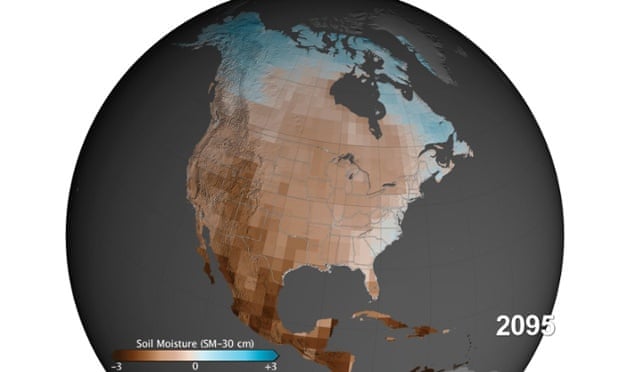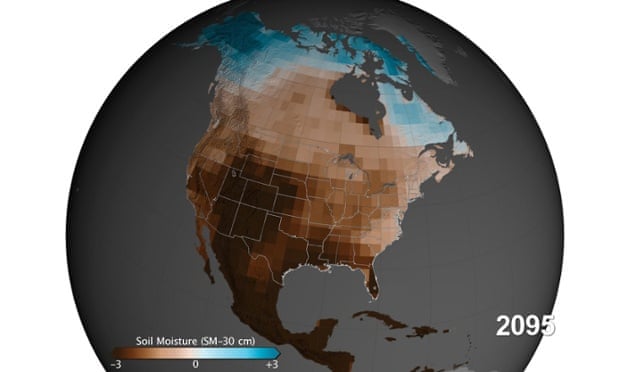 Soil moisture 30 cm below ground projected through 2100 for scenario RCP 4.5, which involves action to reduce carbon pollution. Brown is drier and blue is wetter than the 20th century average. Source: NASA’s Goddard Space Flight Center
Soil moisture 30 cm below ground projected through 2100 for scenario RCP 4.5, which involves action to reduce carbon pollution. Brown is drier and blue is wetter than the 20th century average. Source: NASA’s Goddard Space Flight CenterCalifornia is in the midst of its worst drought in over 1,200 years, exacerbated by record hot temperatures. A new study led by Benjamin Cook at Nasa GISS examines how drought intensity in North America will change in a hotter world, and finds that things will only get worse.
Global warming intensifies drought in several ways. In increases evaporation from soil and reservoirs. In increases water demand. It makes precipitation fall more as rain and less as snow, which is problematic for regions like California that rely on snowpack melt to refill reservoirs throughout the year. It also makes the snowpack melt earlier in the year. The record heat has intensified the current California drought by about 36%, and the planet will only continue to get hotter.
NASA scientists used tree rings to understand past droughts and climate models incorporating soil moisture data to estimate future drought risk in the 21st century.
The study finds that drought intensity will increase, but could be manageable if we follow a path that involves slowing global warming by cutting carbon pollution.
 Soil moisture 30 cm below ground projected through 2100 for scenario RCP 4.5, which involves action to reduce carbon pollution. Brown is drier and blue is wetter than the 20th century average. Source: NASA’s Goddard Space Flight Center
Soil moisture 30 cm below ground projected through 2100 for scenario RCP 4.5, which involves action to reduce carbon pollution. Brown is drier and blue is wetter than the 20th century average. Source: NASA’s Goddard Space Flight Center
However, decades-long mega-droughts in North America could be much worse than those experienced during medieval times, which led to the decline of native populations, if we continue on our current business-as-usual path.
 Soil moisture 30 cm below ground projected through 2100 for scenario RCP 8.5, which involves business-as-usual high levels of carbon pollution. Brown is drier and blue is wetter than the 20th century average. Source: NASA’s Goddard Space Flight Center
Soil moisture 30 cm below ground projected through 2100 for scenario RCP 8.5, which involves business-as-usual high levels of carbon pollution. Brown is drier and blue is wetter than the 20th century average. Source: NASA’s Goddard Space Flight Center
Jason Smerdon, a co-author and climate scientist at Columbia University’s Lamont-Doherty Earth Observatory, described the implications of the study in stark terms,
The 21st-century projections make the [previous] mega-droughts seem like quaint walks through the garden of Eden
The mega-droughts are projected to hit the main agricultural regions in the United States – both California and the Midwest “breadbasket.” The chronic water shortages that are anticipated in these regions under the business-as-usual scenario would make farming, as well as ranching in the American southwest, nearly impossible.
This study reveals the flaw that underlies the ‘CO2 is plant food’ myth.
Posted by dana1981 on Monday, 16 February, 2015
 |
The Skeptical Science website by Skeptical Science is licensed under a Creative Commons Attribution 3.0 Unported License. |